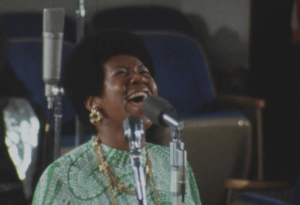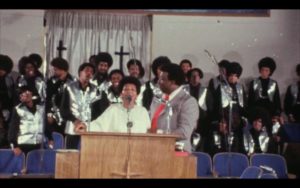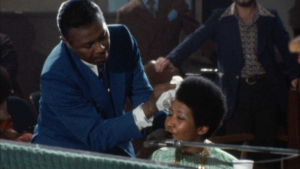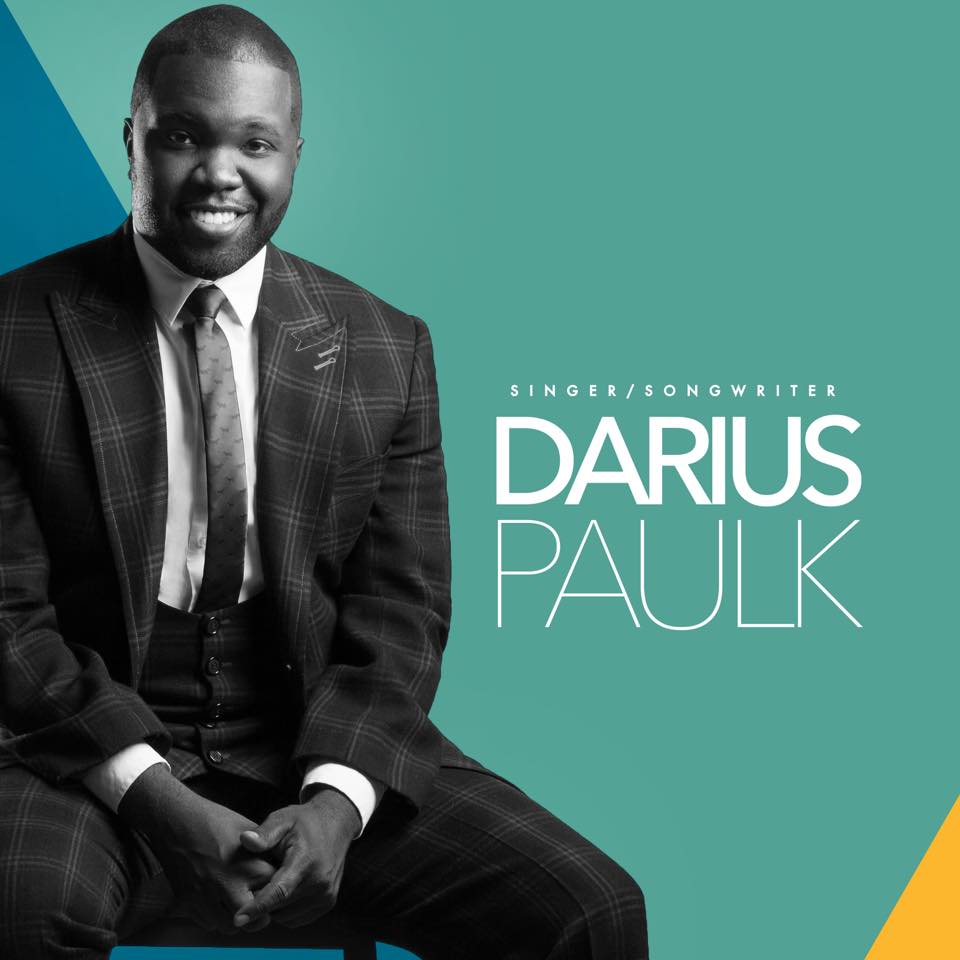Alan Elliott Tells The Gospel Truth Of Amazing Grace

Aretha Franklin’s iconic Amazing Grace LP is by far one of the most critically acclaimed recordings influencing countless singers and musicians and changing the perception of how Gospel music was received and celebrated. Recorded live in Los Angeles over two nights in January, 1972 (shortly after the passing of Mahalia Jackson, the reigning Queen of Gospel), Amazing Grace is the biggest selling album of Aretha’s career. Amazing Grace was awarded the prestigious Grammy Award, reached the Top Ten on both of Billboard’s R&B and Pop charts, and eventually went on to sell more than two million copies, giving it the distinction of being in the top ten ranking of the best selling Gospel albums of all time.
In 1999, Rhino released the unedited masters of the two night session on a double CD collector’s edition. While the actual session was filmed in its entirety by the late Sydney Pollack for Warner Brothers, it has sat in the Warner Brothers‘ vaults for some three-plus decades, until it came to the attention of producer Allan Elliot, who has worked untiringly to bring this film to the masses.
Alan Elliott acquired the film rights in 2007 and worked with a team of producers including Joe Boyd, Robert Johnson, Chiemi Karasawa, Sabrina Owens, Jerry Wexler, Tirrell D. Whittley and Joseph Woolf, to bring the feature-length documentary to light. The film was edited by Jeff Buchanan and its music was mixed by Jimmy Douglass. The documentary is a labor of love and a timely tribute to the music icon, who passed away in August 2018. The film is now ready for release with the complete support of, and blessing from, The Aretha Franklin Estate.
Some time ago, Elliott spoke with GOSPELflava’s roving reporter Gregory Gay. We dusted off our interview and present it below. Hear what he had to say about his own journey with Amazing Grace.
GOSPELflava: Alan, we knew from the liner notes of Amazing Grace that this footage existed. Most of us (myself included) have waited patiently and sometimes impatiently for there to be some movement. Please explain how your involvement in this project came to be.
 Alan Elliott: The way this all happened is with that same kind of fanaticism, it’s an absolute miracle that it ever happened; it’s been a long engaging journey. I worked as a staff producer at Atlantic Records for a number of years. For as long as I can remember, my heroes were the guys who always made those great R&B and Gospel records, and I always thought when I got hired, I would be the young Jewish guy that would make great Gospel and R&B records. So long story short, I learned a great deal from my mentors and even after I left Atlantic, I maintained good communication and stayed very friendly with them. My all time favorite record that they made was Amazing Grace.
Alan Elliott: The way this all happened is with that same kind of fanaticism, it’s an absolute miracle that it ever happened; it’s been a long engaging journey. I worked as a staff producer at Atlantic Records for a number of years. For as long as I can remember, my heroes were the guys who always made those great R&B and Gospel records, and I always thought when I got hired, I would be the young Jewish guy that would make great Gospel and R&B records. So long story short, I learned a great deal from my mentors and even after I left Atlantic, I maintained good communication and stayed very friendly with them. My all time favorite record that they made was Amazing Grace.
[One sleepless night] I was up and I went on YouTube thinking, “ I wonder is there any anything out there, and to my surprise, there was about a minute and a half clip of Aretha singing Amazing Grace from the PBS show American Masters. I was like, wait a second, I forgot about this! So I called up Jerry Wexler (this was prior to his illness) and I said, “Boss, you never told me that this existed, what is the story with this?”, and he said “Oh yeah, we hired this guy Sidney somebody”, and I said, “Sydney, Sydney Pollack?” and he said “Yeah. You know, you’re the Don Quixote type, why don’t you start getting involved?” and so I said “Alright”.
So I got introduced to Sydney Pollack and he said “I wanted to finish that” and I said “Alright, well if I can find out everything about it will you let me produce it?” and he said “Sure”. It was shortly thereafter he got very sick, he would eventually pass away (very untimely) but before his passing, he gave instructions to the people at Warner Brothers, telling them “Make sure Alan finishes this, he will make a great movie out of this.”
So it’s sort of been my calling. You know looking back over the whole experience, it’s really been a labor of love I mean every time we roll any film and we see the band and Reverend Cleveland, hear the choir and hear Aretha, it’s like, oh well, THIS is why we’re doing this. I’ve been working on it now solidly for a long time now, it has been quite an ordeal getting it together. I am very happy to say we’re getting closer, and from the sound of your [own] story, you know that of which I speak. It was that sort of fanaticism that led us all to this.
GOSPELflava: Amazing Grace is dripping with significance and historical merit. This was the premiere outing for Rev James Cleveland’s Southern California Community Choir, they had just been organized just 2 years earlier and this would be the very vehicle that led them to be cast in the Blues Brothers film. On the unedited masters released by Rhino in 1999, the choir marches in on one of Reverend Cleveland’s favorite songs, “We Are on Our Way”. Reverend Cleveland loved the song so very much that it was still in use during Sunday morning worship services at Cornerstone in 1988 (says Jeffrey LaValley, who served as a principal musician and producer of the LA Gospel Messengers’ Praise 88 recording), although SCCC never recorded the song again. 
Alan Elliott: There was such power in the delivery of “We Are on Our Way”. When we had to put together the memorial service for Jerry Wexler, I insisted that’s what they walk in with, it’s such a powerful piece. And I made the mistake, it’s so funny you start listening to people when they said In the early stages of getting the film together that we had to put together a trailer, and it’s so funny, you listen to people and they tell you, “Oh the trailer has to be exciting, and we have to make it this and we have to make it that”. And so finally I said “No, we have to start with ‘We Are on Our Way'”, and that is what you see.
GOSPELflava: The musical service had a special feel to it. The audience alone had such heavyweights as Clara Ward, Aretha’s father Reverend CL Franklin and on the trailer you can even find the Rolling Stones’ Mick Jagger doing the holy dance. Not to mention the band made up of Kenny Lupper, Chuck Rainey, Cornell Dupree and Bernard Purdie.
Alan Elliott: Oh yeah. We can’t forget the band. Jerry Wexler persuaded Aretha to use King Curtis’ band The Kingpins on her Live at Fillmore West album, so they become the heart of Amazing Grace. Billy Preston played organ on the Live at Fillmore session, and of course around this time, Billy has played on a number of Beatles recordings including the Abbey Road LP and “Let it Be”. So by now, Billy has attained the status and is recognized as “the fifth Beatle”, so at this point Billy is in and out of the touring band.
It’s an interesting thing, the King Curtis Band with Chuck Rainey on bass, Cornell Dupree on guitar and Bernard on drums; it starts to become sort of that New York Funk scene which becomes “Stuff” [the NY-based jazz-funk band]. Another Beatles fact, Aretha, while singing “Oh Mary Don’t You Weep” references “My Sweet Lord” and on the outros the band plays George Harrison’s “My Sweet Lord” (which was included on the Rhino reissues), which is also great because there is an unbelievable shot; my favorite shot of the footage we have developed is of the band playing the walk out with Rev Cleveland saying, “See you tomorrow night”, you know there are people like you and I that can quote the entire record verbatim. Marvin Winans is one of those people; he can quote every single thing on the record, like we can.
So back to the composition of the band, the reason I brought up the New York Funk Scene was because Richard Tee (Aretha’s regular traveling musician) was flown out to LA to become the keyboardist for the session and now Richard Tee got off the plane and they got into the church and Rev Cleveland said to Jerry Wexler, “Well, we have this guy Kenny Lupper and he is better than Richard Tee”, and so they went back and forth “Yes he is”, “No he’s not”, and Jerry Wexler said to me that after hearing Kenny Lupper play, Richard Tee never got off the bench to get to the organ because Kenny was so good. Kenny was one of those guys who came out of Rev Cleveland’s church; there was Billy, Clarence McDonald, and Alexander Hamilton. Kenny and Billy both wound up touring with the Rolling Stones after this session, so Mick might have been on a fact-finding mission that night or who knows, it seemed everybody who was looking to get more interesting they brought on Billy; Billy went on to open for George Harrison in 1973 on his concert tour and Kenny is playing keyboards on that, Kenny has a tragic end dying very early, but he was a monster, when you listen to that record and how great the organ playing is, you know it, –the end of “God Will Take Care of You” with the choir and the band, and then they break out into the shout, it’s great music.
When I found this whole thing, I said, well this is the premiere document of not only Gospel music, but Black music, ever made; it’s just that important. It’s also great because Sydney knew what a fan I was of it, and knew that it had to get finished and said to Warner Brothers, “Just make sure that Alan finishes it”.
GOSPELflava: While the album Amazing Grace was a trip back to the good old days of Gospel music for traditionalists, it also has great potential in reaching a younger audience
Alan Elliott: It’s a whole other ballgame because it’s transcendent; Jerry Wexler had so many great things to say about it. He was so smart about the way he approached it; I talked about it with him for a long time, unfortunately, he passed after we started getting going, too. After Sydney died, I started recording all of my conversations with Jerry and in our conversations, he talks about how he took this band, this R&B/Pop band coming off big hits coming and rehearsing in the church because he didn’t want them to sound like an R&B band, he wanted the authentic sound of the church, and it’s a fascinating thing. You know you always have those instances where people would say, “Well you don’t have to hire those guys, I have this great band at my church”. But you have to consider, with all due respect, [that] these guys are the best you will ever hear. They went and they rehearsed with the choir, worked out the arrangements with Rev. Cleveland, Alexander and Aretha, and there was that fervor. In the back of Jerry’s mind is the notion that we are [just] coming off the intensity of the Edwin Hawkins Singers‘ “Oh Happy Day” hit, which is why everyone is thinking, “Oh yeah, maybe we can make a Gospel album, just maybe there is a hit there”. So in that sweet spot of people trying to make something spiritual and something funky and something that’s a hit, they hit pay dirt. And it’s phenomenal. When you see the whole two and a half hours, you get to see it all, the choir, the band and you get to see Aretha at her greatest.
 In addition to Aretha and James Cleveland, you get to see the mastery of Alexander Hamilton. I must say Alexander is the nicest gentleman you will ever meet, when you see the film just from the trailer you will see this is the man that’s running everything and you really don’t get it until you see the film footage. We’ve had a number of revelations like that, its sort of like giving sight to a blind man, you know we lived with this record for over 45 years and then when I got it, its like “Oh my God”, because you figure Reverend Cleveland is the man in command –and he is, don’t get me wrong, –but there are several instances, like when he’s doing “We’re on Our Way”, he is really into it, and he has such power and Alexander Hamilton is commanding the band and the choir, and at other times being the conduit between Aretha and James, telling the band what to do and where to go, he even plays piano a bit. He is just wonderful, he did everything.
In addition to Aretha and James Cleveland, you get to see the mastery of Alexander Hamilton. I must say Alexander is the nicest gentleman you will ever meet, when you see the film just from the trailer you will see this is the man that’s running everything and you really don’t get it until you see the film footage. We’ve had a number of revelations like that, its sort of like giving sight to a blind man, you know we lived with this record for over 45 years and then when I got it, its like “Oh my God”, because you figure Reverend Cleveland is the man in command –and he is, don’t get me wrong, –but there are several instances, like when he’s doing “We’re on Our Way”, he is really into it, and he has such power and Alexander Hamilton is commanding the band and the choir, and at other times being the conduit between Aretha and James, telling the band what to do and where to go, he even plays piano a bit. He is just wonderful, he did everything.
It is such a fabulous story. I could not ask for a better project to work on and I am such a huge fan of the album. In the end, I know we will do Sydney’s film justice and I hope we are able to do right by Aretha and the lovers of Gospel music and music overall.



NO COMMENTS